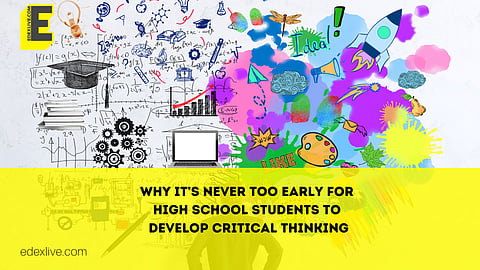

Good grades used to be enough.
Not anymore. In just a few years, 92 million roles will be displaced, and four in 10 skills employers care about will shift, according to the World Economic Forum.
To keep up and make a real impact, students don’t just need to be good at studying — they need to think critically, ask better questions, and come up with creative solutions. That’s why complex problem-solving skills need to come in early.
These skills go far beyond school. They help students make better choices, stand out in their future careers, and even drive real change to communities. The earlier students start building them, the better prepared they will be for what lies ahead.
So why should high school students focus on building critical thinking and problem-solving skills?
Future jobs demand them: Good marks are important, but today’s colleges and jobs need more. According to the World Economic Forum’s Future of Jobs Report 2025, 70% of employers plan to hire staff with new and adaptable skill sets.
The data also highlights that analytical thinking, resilience, flexibility and agility are among the top skills in demand by employers. Companies want people who can think clearly, solve real problems, and work well with others. If you can build these skills early, you’ll have a real advantage down the road.
Critical thinking isn’t taught the same way everywhere. The development of critical thinking skills through schooling varies dramatically. Although these skills can decide a student’s success in the near future, how well they are taught can vary from school to school and teacher to teacher. Complementing the foundation received from schools is key.
They help make smarter, more confident decisions: Critical thinking helps you weigh your options, see the bigger picture, and choose what’s best for you — whether it’s picking a college, handling peer pressure, or planning your career.
They empower you to lead and catalyse change: When you learn to think deeply, you begin to question things, challenge the status quo and help solve big issues in your community or even the world. It’s these students who will rise as problem-solvers and effect real change.
They shape tomorrow’s leaders: The next generation of leaders will be the ones who adapt, innovate and lead with vision. These skills will help you stand out and shape the future in your own way.
How can students build these skills?
Stay curious: Ask why. Ask how. Ask what if. The more curious you are, the better you’ll get at thinking critically. Ask the right questions. The more you ask, the more you grow.
Do real research: Dig into topics that interest you. Gather facts and figure out how things connect. Research trains your mind to analyze, question, and reason. It’s also important to recognize the difference between real research and a basic project.
Real research demands clarity on assumptions, solid evidence, and a structured approach to inquiry. It involves formulating questions, evaluating sources, and drawing conclusions based on critical thinking. An accredited research framework is the most reliable way to build logical and critical thinking skills.
Network with global peers: Connecting with global peers develops cross-cultural perspectives, cultivating a deep understanding of local issues within a global context and empowers students to create meaningful impact in their communities.
Learn across subjects: Synthesise knowledge that you gain from different subjects. This helps you look at problems in new ways and come up with better solutions.
Get involved in real-world projects: The best way to build problem-solving skills is through action. Hands-on experiences and real-world challenges help you move beyond theory and apply what you learn in meaningful ways. Navigating complex problems is hard, especially for high school students facing them for the first time. Choosing a project guardrailed by a robust framework and expert guidance is key to learn the right way.
The best way to start: Global Problem Solving Institute (GPSI)
While high schools are doing their part, there are programs built specifically to help Indian students strengthen critical thinking and problem-solving skills. One such example is the Global Problem Solving Institute (GPSI) — a first-of-its-kind global learning initiative by Pioneer Academics.
GPSI equips high school students with:
Interdisciplinary research skills
Hands-on problem-solving experience
Global collaboration opportunities
What Makes GPSI Unique for Students:
Learn how to research and develop innovative solutions to global problems like climate change, water access, or AI ethics.
Work with students and mentors from around the world and bring those ideas back to your local community.
Grow your confidence, creativity, and critical thinking skills to gain a competitive edge in academics and beyond.
It’s live and interactive, not a recorded course so you stay involved and on track.
GPSI isn’t just about academics. It helps you become someone who thinks deeply, acts responsibly, and cares about making the world better.
If you want to get ready for the future, now is the time to start thinking critically, solve problems, and step up as a leader.
